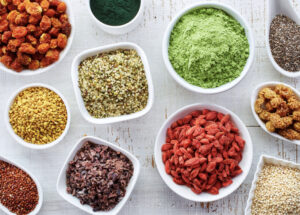It’s easy to get on board with adding superfoods to your diet. After all, who doesn’t want their food to be super? But while you’ve seen (and probably tried) a few of the biggest superfood trends, including cauliflower-crust pizza and adding avocado to everything, ask yourself: do you know what a superfood really is?
If not, you’re certainly not alone. Although Mirriam-Webster defines a superfood as “a food (such as salmon, broccoli, or blueberries) that is rich in compounds (such as antioxidants, fiber, or fatty acids) considered beneficial to a person’s health,” there are many definitions. It’s helpful to think of superfoods as whole or minimally-processed foods with a significant nutritional punch. Most superfoods deliver a substantial dose of disease-fighting nutrients like phytonutrients, vitamins, minerals, and fiber. For nutritionists, those added nutrients set superfoods apart, but foods like broccoli and salmon weren’t given that title at discovery. Superfoods don’t become superfoods without a significant amount of media attention.
Whether or not a food ultimately catches on as a superfood really depends on whether the public deems them worthy of that title. So once a food earns some eye-catching nutrition stats and goes viral on the internet, boom. This often happens to foods that have always been healthy, but people tend to pass by at the grocery store, like kale and brussels sprouts. So while superfood may be more of a superficial title, that doesn’t mean there aren’t superfoods worth adding to your diet. Here are a few of our favorites.
Blueberries are a rich source of antioxidants, specifically anthocyanins, which give them their deep blue color. These antioxidants help protect your body from cellular damage caused by free radicals. Blueberries are also a good source of fiber, vitamin C, and vitamin K.
Kale is a leafy green vegetable that is packed with nutrients. It is a great source of vitamins A, C, and K, as well as calcium, potassium, and iron. Kale is also rich in antioxidants, including flavonoids and carotenoids, which help protect against chronic diseases.
Chia Seeds are small black seeds that are high in fiber, protein, and healthy fats. They are also a good source of calcium, magnesium, and phosphorus. Chia seeds are rich in antioxidants, including flavonoids and lignans, which help protect against chronic diseases.
Avocado is a fruit that is rich in heart-healthy monounsaturated fats. It is also a good source of fiber, potassium, and vitamins C and K. Avocado is high in antioxidants, including carotenoids and tocopherols, which help protect against chronic diseases.
Spinach is a leafy green vegetable that is low in calories but packed with nutrients. It is a good source of vitamins A, C, and K, as well as folate, iron, and calcium. Spinach is also rich in antioxidants, including flavonoids and carotenoids, which help protect against chronic diseases.
At The Juice Hive, we’re committed to blending, juicing, and serving fresh foods that taste as great as they are for you. Whether you join us for a smoothie, salad, or cold-pressed juice or pick up a few better-for-you snacks at our Emporium, we have a wide variety of delicious foods that will help you feel your best, inside and out. We’re open Mon-Fri (8 am-3 pm) and Sat (8 am-2 pm).



